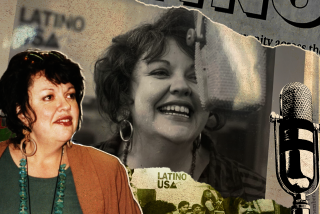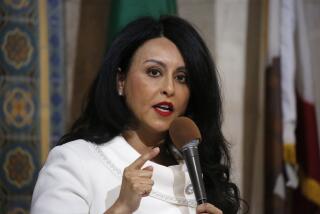Radio Marti’s Move to Miami Strains Credibility, Critics Say : Lawmakers, others warn against relocation to heart of Cuban American community.
- Share via
MIAMI — Since Radio Marti began beaming news and entertainment into communist Cuba 11 years ago, critics have called it little more than a taxpayer-funded voice for powerful Cuban exile groups to promote their own political agenda.
Now several lawmakers and other critics fear that the credibility of the government’s $25-million-a-year campaign will be further compromised when it relocates its headquarters from Washington to Miami, the heart of the Cuban American community.
For two years the U.S. Information Agency had been looking into allegations of political reprisals, cronyism and slanted news coverage in its Office of Cuba Broadcasting, which runs a radio station and a television station.
That investigation, plagued by leaked reports and partisan political bickering, ground to a halt earlier this year when a bill sponsored by Sen. Phil Gramm (R-Texas) abolished the job of the person conducting it, USIA Inspector General Marian Bennett. The same legislation authorized Radio Marti’s move to Miami.
But the sworn testimony of current and former employees, contained in affidavits obtained by The Times and several other news organizations, details repeated instances in which decisions on staff and news coverage at Radio Marti have been influenced by Miami Cuban exile leader Jorge Mas Canosa.
Mas Canosa, a multimillionaire businessman, fervent foe of Cuban President Fidel Castro and chairman of the Cuban American National Foundation, lobbied hard for Radio Marti’s creation and has chaired the president’s advisory board on broadcasting to Cuba since the station went on the air in 1985.
“To the extent that Radio Marti is seen as just another Miami exile station, its effectiveness is diminished,” said Frank Calzon, Washington representative of the human rights group Freedom House. “I’m sure Castro is happy they are moving out of Washington.”
The controversy over the move to Miami is just the latest in a continuing series of politically charged imbroglios that have plagued the Office of Cuba Broadcasting, and U.S. policy toward Cuba generally, for 36 years.
Radio Marti, modeled after the Voice of America, was created by Congress in 1983 to offer an unbiased source of news to Cuba’s 11 million people.
Although Spanish-language Voice of America broadcasts were widely heard in Cuba, Mas Canosa and other supporters convinced a bipartisan majority in Congress that Cubans deserved a round-the-clock broadcast of news, music and variety shows aimed expressly at them. The station has a staff of 146 and an annual budget of $13 million.
“Without doubt we are the No. 1 [radio] station inside Cuba,” said Rolando Bonachea, acting director of Radio and TV Marti.
Recent surveys conducted by USIA and the Gallup Organization showed that when asked specifically about Radio Marti, 76% of Cuban emigres and visitors in Miami said they had listened when in Cuba. But a sample of Cubans on the island found that only 16% said they tuned in at least once a week.
TV Marti, by contrast, is jammed by the Castro government and has been seen by virtually no one inside Cuba since its launch in 1987. Nonetheless, a staff of 85 continues to produce daily broadcasts at an annual cost of $11.6 million, although the State Department’s 1997 spending bill, as approved by the House Appropriations Committee, would abolish TV Marti and use the $11.6 million for more border guards.
Bonachea denies that Mas Canosa influences news coverage. And he defends the move to Miami as logical and economical. Radio Marti staff members, he said, work behind “a firewall of protection that ensures that our journalists can operate freely from outside influences or internal pressures.”
But the testimony of current and former Radio Marti staff members suggests otherwise. In an interview with USIA investigators last year, station personnel director Bruce Boyd said that Mas Canosa pressured Bonachea in 1991 to hire Augustin Alles, who could not speak English, as news director, even though fluency in English was a requisite of the job.
Alles then took direction about news coverage from Mas Canosa, according to testimony of Bruce Sherman, Radio Marti’s deputy director. “Mr. Mas would often call Mr. Alles directly to request news coverage of Mr. Mas’ own activities or those of the Cuban American National Foundation,” Sherman said.
Sherman said that Alles once telephoned him at home at 10 p.m. to say Mas had called to report that President Bush, during a Miami campaign stop, had singled out Mas for mention. “Mr. Alles told me Mr. Mas had asked him to provide immediate coverage of this event that same evening. Mr. Alles complied.”
Sherman told investigators that eventually he was stripped of all meaningful duties at the station, although he remains as deputy director. Alles is also still with Radio Marti, although in March 1995 he was transferred to the Miami bureau and named assignment editor.
Another Radio Marti staff member, Kristin Juffer, former director of audience research for the Office of Cuba Broadcasting, testified that survey figures were “cooked” to reflect inflated estimates of the number of listeners and viewers inside Cuba. She attributed release of the inaccurate figures to Antonio Rivera, Radio Marti’s Miami-based director of field services and a Mas Canosa friend.
After Juffer questioned Rivera’s survey data, she said, she found more than 100 files related to the Cuba surveys wiped out of her computer.
In 1994, Juffer’s job was abolished as part of what officials called a streamlining effort at Radio Marti but what she calls retribution. “I believe I was removed from my position so that Rivera could once again control and ‘cook’ the Cuban audience data and once again mislead Congress,” she testified.
When Bennett’s job as USIA inspector general was abolished, she took a job at the State Department, which inherited the Radio Marti investigation. Linda Topping, a State Department spokeswoman, said that officials there “are reviewing the report to see what needs to be done to complete it.”
Mas and Bonachea have refused to cooperate with the USIA inquiry, labeling as unfair Bennett’s release last year of partial results of the investigation to selected members of Congress, including some who have long opposed federal funding. A spokesman for the Cuban American National Foundation has called the investigation “a political witch hunt.”
Bennett has asked USIA Director Joseph Duffey to order Bonachea to testify. Duffey has said that he “instructed” Bonachea to testify while seeking assurances from Bennett that no criminal charges were being considered.
Wayne S. Smith, who was chief of the U.S. interests section in Havana and opposed Radio Marti when it was proposed in 1982, said that Cubans increasingly see the broadcasts “as the voice of right-wing exiles.”
“Radio Marti has declining listenership and credibility,” said Smith, now a senior fellow at the Center for International Policy in Washington. “Moving the station to Miami, without public hearings, is utterly irresponsible. The Clinton administration just gave in to Mas on this, and now he’s running the store.”
More to Read
Sign up for Essential California
The most important California stories and recommendations in your inbox every morning.
You may occasionally receive promotional content from the Los Angeles Times.










